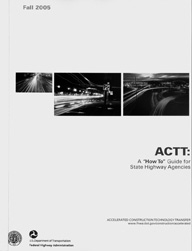| << Previous | Contents | Next >> |
Highway Quality Compendium
ACTT Now
|
|
Join the accelerated construction bandwagon. Over the past 2 years, more than half of States have realized the benefits of accelerated highway construction by participating in the Accelerated Construction Technology Transfer (ACTT) program. Started by the Transportation Research Board, American Association of State Highway and Transportation Officials, and the Federal Highway Administration (FHWA), ACTT brings State highway agency staff together with national experts in a range of skill sets for a 3-day workshop. At the workshop, participants identify innovative approaches to reducing time, costs, and congestion for a planned highway project while improving safety, quality, and roadway performance.
Over the course of the workshops to date, millions of dollars and years of delays have been shaved off of highway projects, with projects ranging in size from those with $1 million budgets to those projected to cost more than $2.5 billion. Most ACTT workshops have resulted in a reduction of planned construction time by 30 percent or more.
All States can now join in the success of ACTT by holding their own accelerated construction workshops, with the assistance of their FHWA division offices and the Accelerated Construction Management Team (ACMT). This team will help States plan, organize, and carry out workshops, which are now eligible for Federal-aid funding. "The ACMT will help States incorporate ACTT into select major reconstruction and rehabilitation projects, boosting the rapid transfer of fresh technology solutions, minimizing risk, and potentially saving construction time and dollars,"says Jim Sorenson of FHWA's Office of Asset Management and a member of the ACMT. "Our goal is to spare motorists and communities from any avoidable construction-related traffic disruption, while helping agencies deliver state-of-the-art roadways that meet the demands of our increasingly mobile society."
Factors to consider in selecting an ACTT project include:
- Does the project involve major reconstruction and/or rehabilitation work that will begin over the next 4-6 years?
- Is there an urgent need to accelerate construction?
- Are the project limits or boundaries still fluid?
- Is the project team open to innovation and willing to consider and apply fresh concepts?
To assist States in planning an ACTT workshop, a new publication is available from FHWA, ACTT: A "How To" Guide for State Highway Agencies (Publication No. FHWA-IF-05-038). The guide includes background information on the ACTT program and details on how to plan and hold a workshop. Also included are sample workshop agendas and lists of the various ACTT skill sets and their team leaders. Skills sets cover such areas as design, contracting, financing, construction, right-of-way/utilities, and the environment. The ACMT will maintain a national roster of skill set experts and assist States in setting up a skill set team for a workshop.
"Over the course of the workshops to date, millions of dollars and years of delays have been shaved off of highway projects, with projects ranging in size from those with $1 million budgets to those projected to cost more than $2.5 billion." |
During the next few years, the ACMT will be working with States who have held an ACTT workshop and are now moving their ACTT project or corridor into the construction phase. ACTT workshop recommendations will be tracked to see which ones are actually implemented and how much is actually saved in time and costs. "We are committed to making the ACTT process a standard business practice for highway agencies on major reconstruction or rehabilitation projects," says King W. Gee, FHWA's Associate Administrator for Infrastructure. "Demonstrating real-world results is essential for the success of this effort."
Additional information on ACTT, including articles and reports on workshops held to date, is available at www.fhwa.dot.gov/construction/accelerated. To learn more about holding an ACTT workshop in your State, to obtain a copy of the ACTT "How To" Guide, or to obtain a copy of the 2005 status report, ACTT Now (Publication No. FHWA-IF-05-039), contact your local FHWA Division Office. Information is also available from Jim Sorenson in FHWA's Office of Asset Management, 202-366-1333 (fax: 202-366-9981; email: james.sorenson@fhwa.dot.gov), or Jerry Blanding in the FHWA Resource Center in Baltimore, Maryland, 410-962-2253 (fax: 410-962-4386; email: jerry.blanding@fhwa.dot.gov).
Reprinted from Focus, October 2005.
| << Previous | Contents | Next >> |


